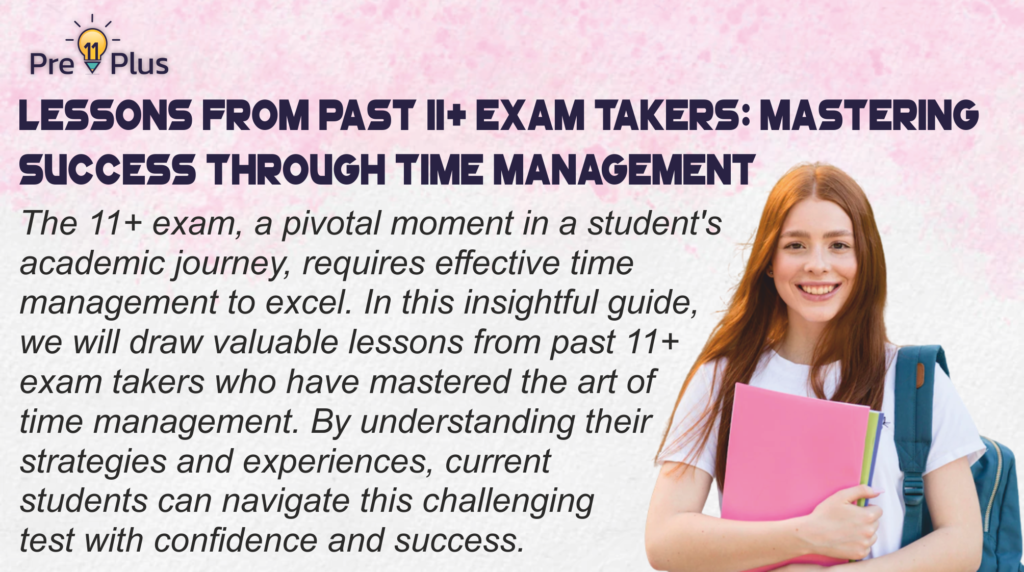Lessons from Past 11+ Exam Takers: Mastering Success through Effective Time Management
The 11+ exam is a pivotal moment in a student’s educational journey, and effective time management plays a crucial role in achieving success. In this guide, we will draw valuable lessons from past 11+ exam takers who have mastered the art of time management. By understanding their strategies and experiences, current students can navigate this challenging test with confidence and success.
The Significance of Time Management :
Time management is a critical skill for 11+ exam takers. This selective entrance examination, taken by students in their final year of primary school in the UK, evaluates their aptitude in subjects such as Mathematics, English, Verbal Reasoning, and Non-Verbal Reasoning. Achieving success in this exam is not solely about subject knowledge; it’s also about effectively allocating and utilizing the limited time available during the test.
Lessons from Past 11+ Exam Takers :
Setting Priorities:
Many successful 11+ exam takers emphasize the importance of setting clear priorities. They recommend identifying their weaker areas and allocating more time to these subjects during their revision.
Creating a Study Schedule:
Past exam takers highlight the value of creating a study schedule or timetable. This structured approach helps in managing time efficiently and ensures that all subjects receive adequate attention.
Practice Makes Perfect:
Practicing past papers and sample questions is a common strategy among successful candidates. This approach not only helps in familiarizing oneself with the exam format but also improves time management during the actual test.
Simulating Exam Conditions:
Several past exam takers recommend simulating exam conditions during practice sessions. This includes timing themselves while solving practice papers to get a feel for the pace required during the actual exam.
Effective Note-Taking:
Efficient note-taking techniques, such as summarizing information in concise bullet points, help students absorb and retain key concepts, ultimately saving time during revision.
Regular Breaks:
Many successful 11+ exam takers stress the importance of taking regular short breaks during study sessions. These breaks help refresh the mind and maintain focus, leading to better time utilization.
Time-Tracking Tools:
Several past exam takers used time-tracking tools like timers or smartphone apps to manage their study sessions effectively. These tools can help maintain discipline and stay within time limits.
Applying Time Management Techniques :
Implementing these lessons from past 11+ exam takers requires commitment and dedication. Here’s how current students can apply these time management techniques:
Set Clear Goals:
Identify your strengths and weaknesses in each subject. Set specific goals for improvement, allocating more time to areas where you need the most work. Regularly assess your progress to ensure you stay on track.
Create a Study Schedule:
Develop a well-structured study schedule that covers all subjects and allows time for regular revision. Ensure that your schedule accounts for your individual learning pace and preferences.
Practice Regularly:
Incorporate regular practice sessions with past papers and sample questions into your study routine. This not only enhances your knowledge but also familiarizes you with the exam’s time constraints. Gradually increase the complexity of questions as you progress.
Simulate Exam Conditions:
During your practice sessions, time yourself as if you were taking the real exam. This helps build a sense of urgency and improves your ability to manage time effectively under pressure. Experiment with different time allocation strategies to find what works best for you.
Optimize Note-Taking:
Learn to take concise and effective notes that highlight essential concepts. Well-organized notes are easier to review, saving valuable revision time. Consider using digital note-taking tools for even greater efficiency.
Take Short Breaks:
Don’t underestimate the power of short breaks. Include brief intervals in your study schedule to recharge your mind. Use this time to stretch, hydrate, or engage in a quick relaxation exercise.
Use Time-Tracking Tools:
Consider using timers or productivity apps to monitor your study sessions. These tools can help you stay on track and ensure you adhere to your schedule. Analyze your tracked data to identify areas where you can further improve time management.
Seek Support and Guidance:
Don’t hesitate to seek support from teachers, parents, or tutors if you encounter challenges in managing your study time effectively. They can provide valuable insights and customized strategies based on your unique needs.
Conclusion :
Time management is a valuable skill that can significantly impact your performance in the 11+ exam. Drawing lessons from past exam takers who have excelled through effective time management can be a game-changer for current students. By setting priorities, creating structured study schedules, practicing regularly, simulating exam conditions, optimizing note-taking, taking short breaks, using time-tracking tools, and seeking support and guidance, you can master this essential skill and increase your chances of success in the 11+ exam. Remember, effective time management not only leads to better academic outcomes but also cultivates a valuable life skill that will serve you well in future endeavors.












